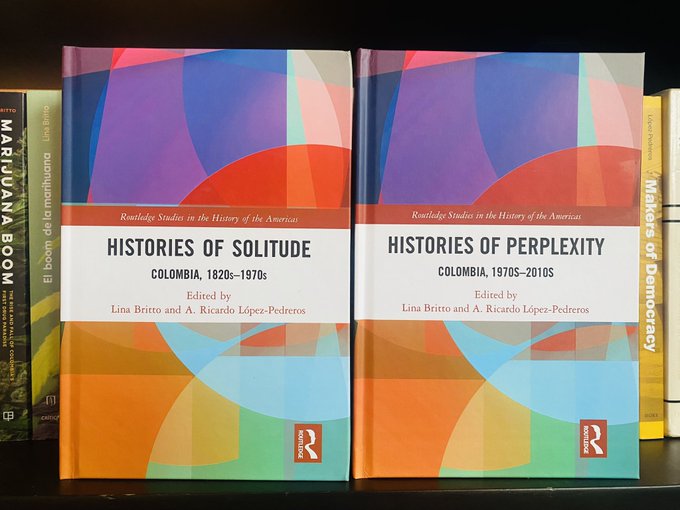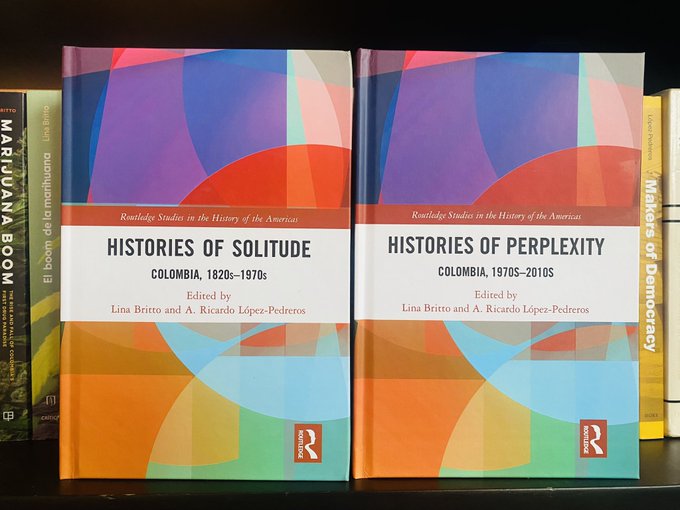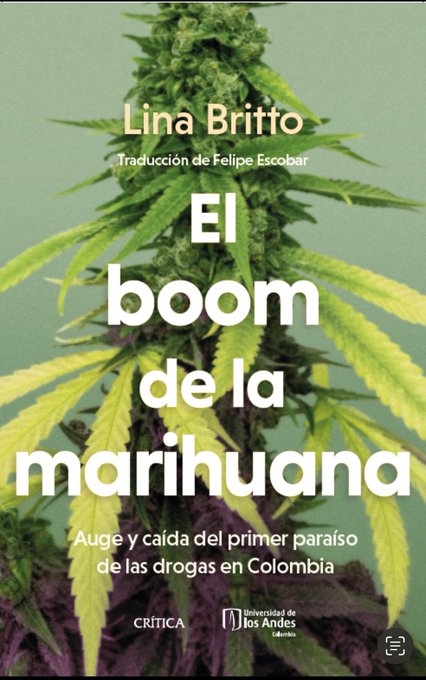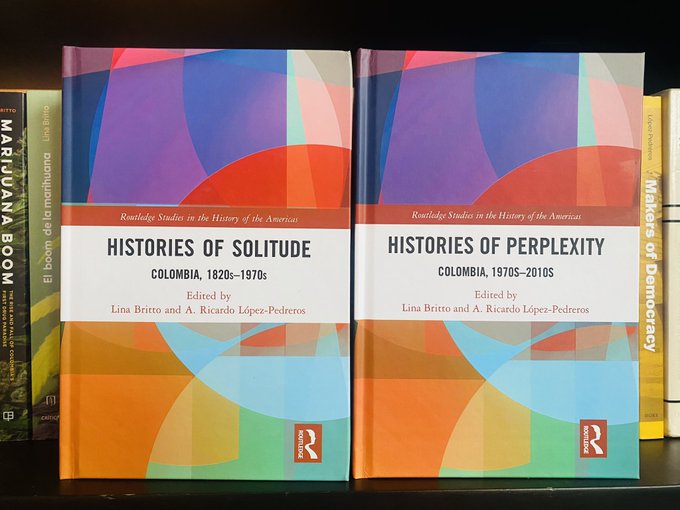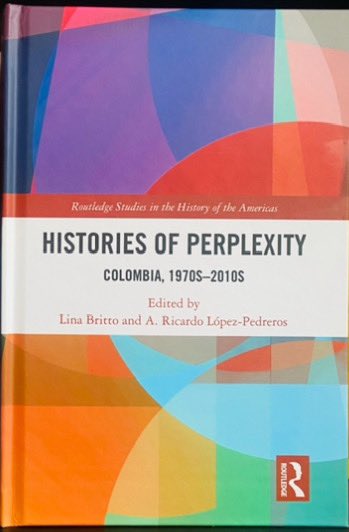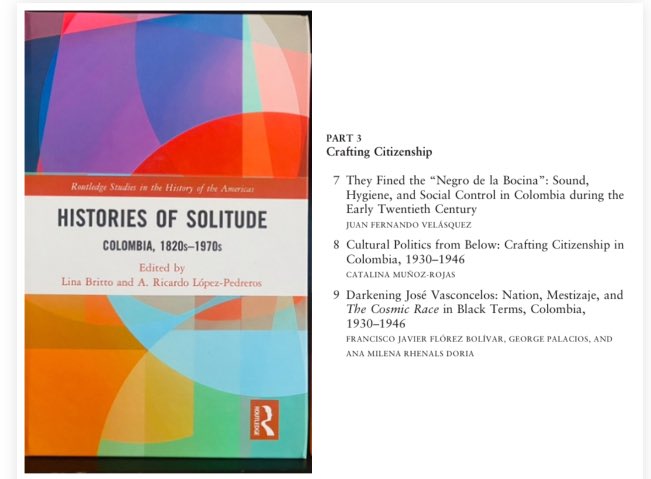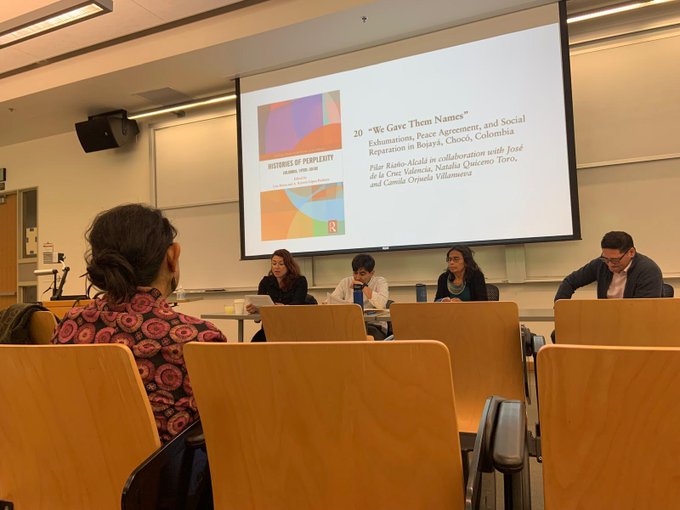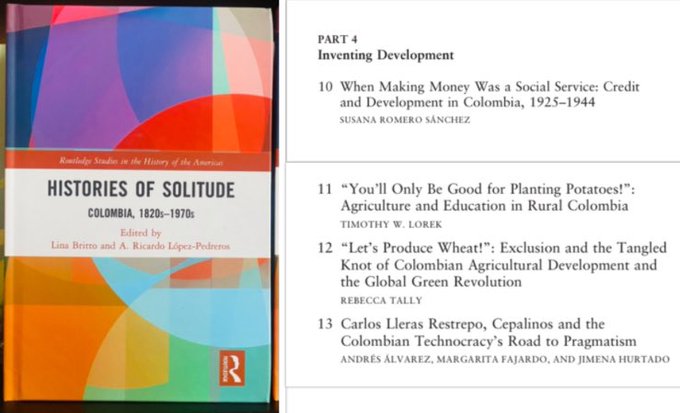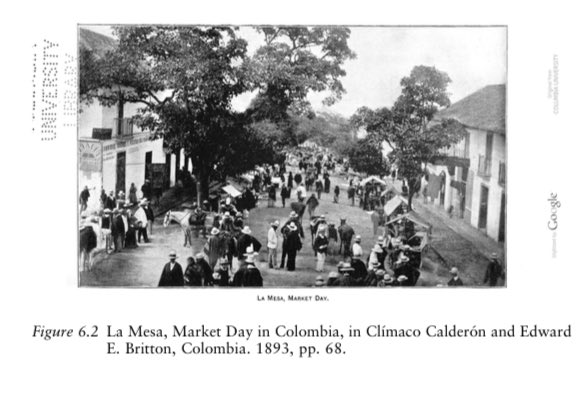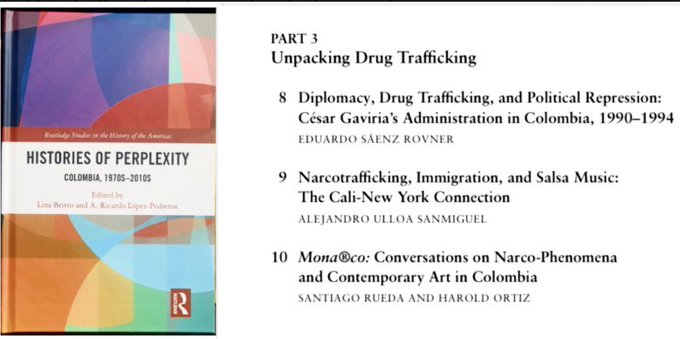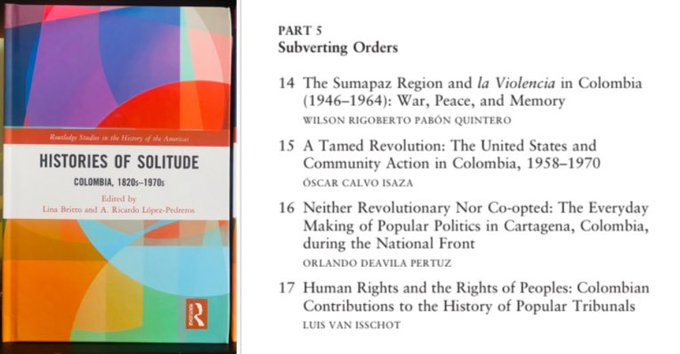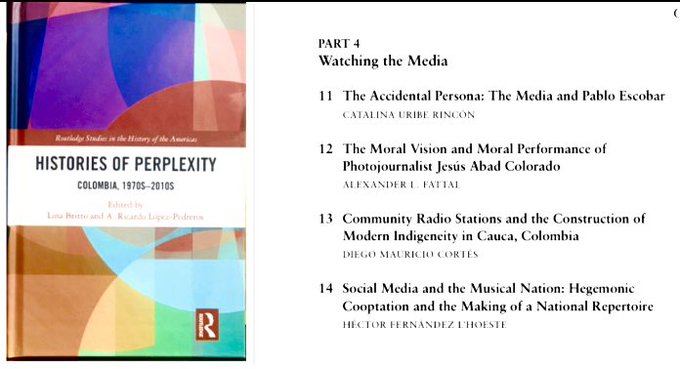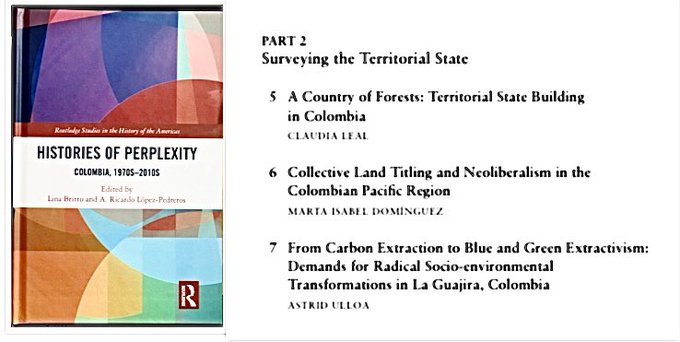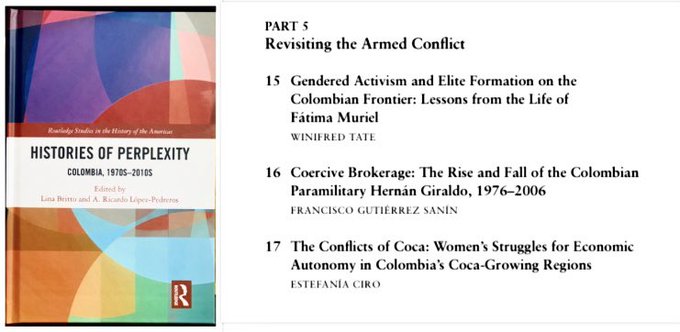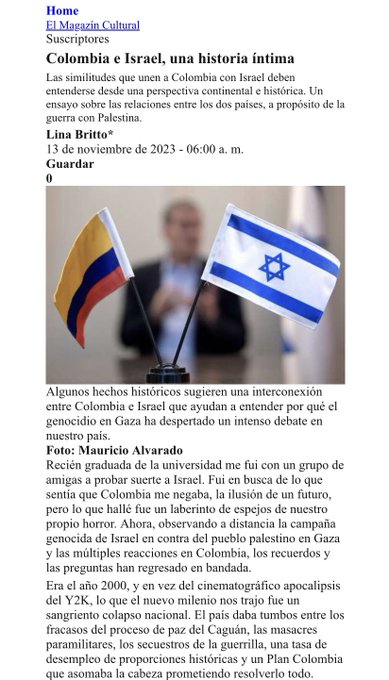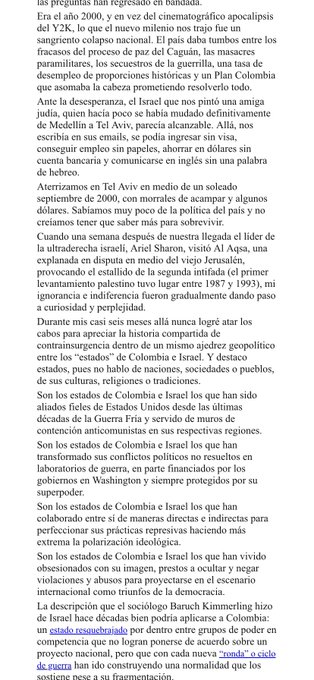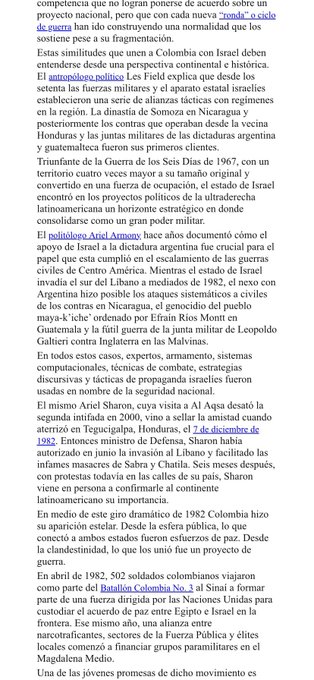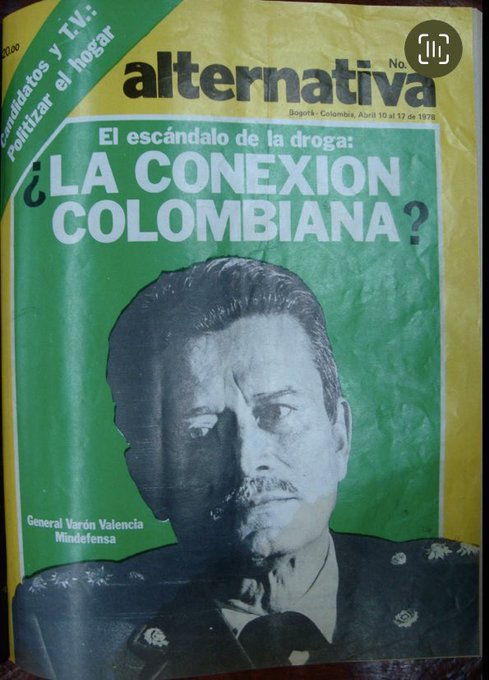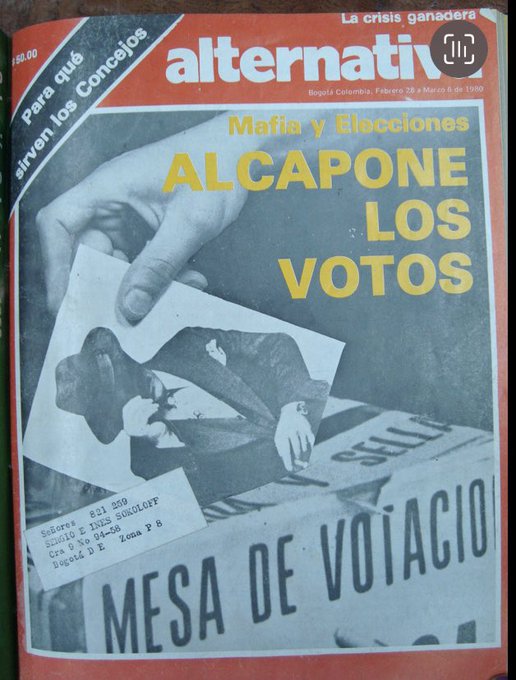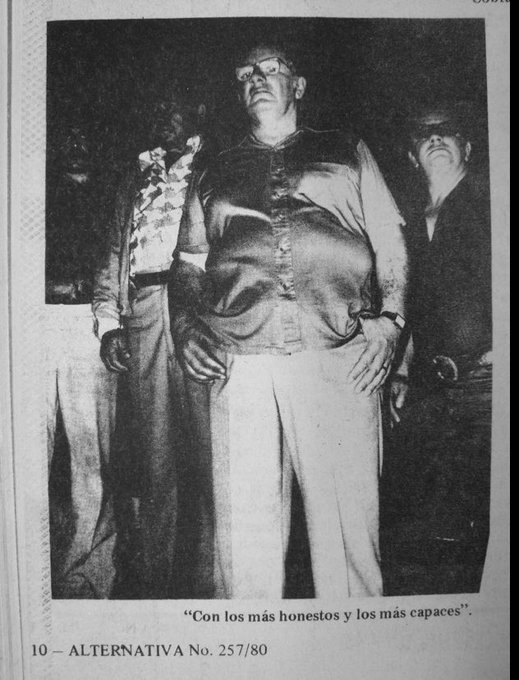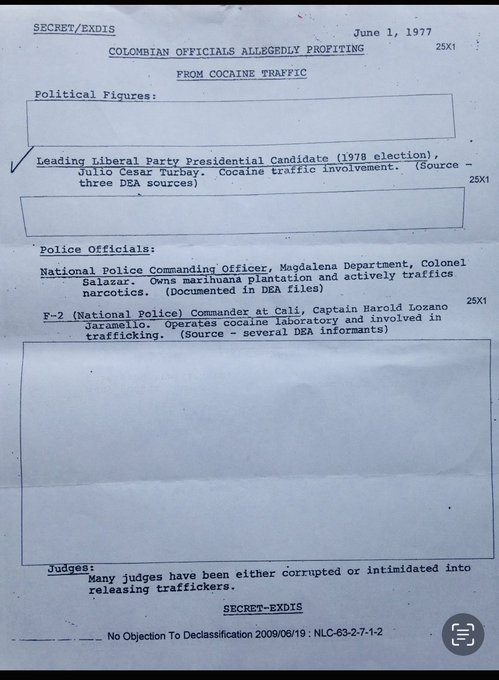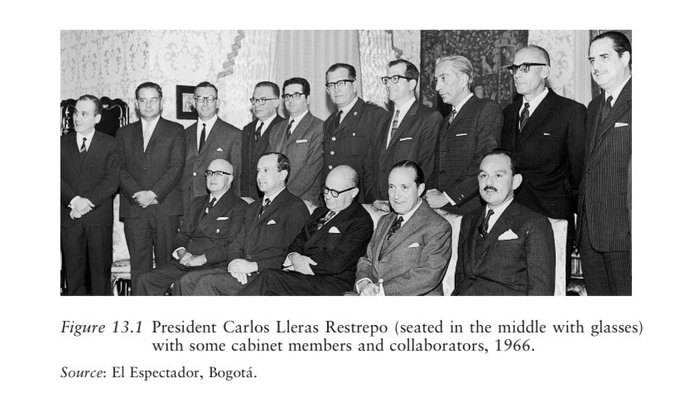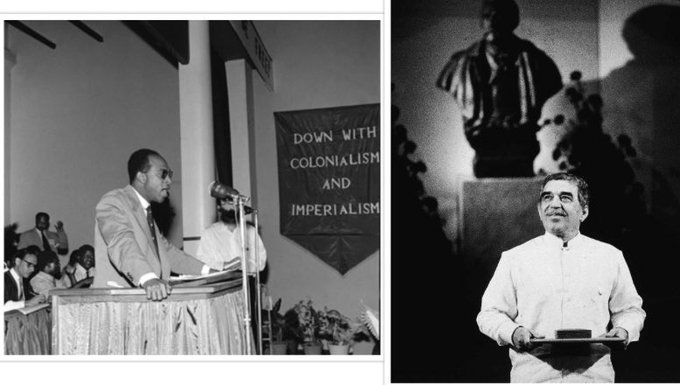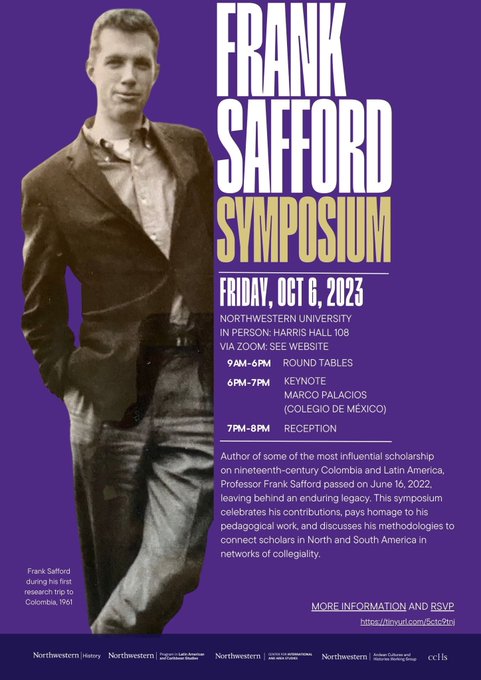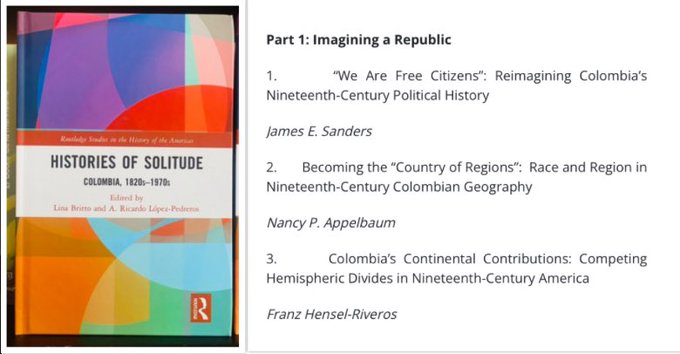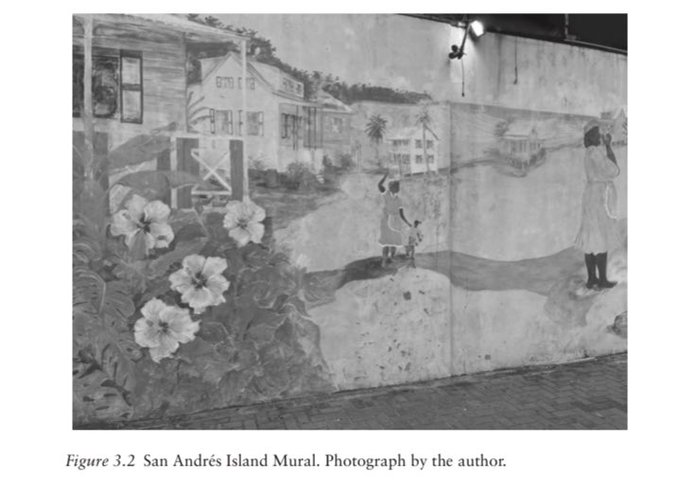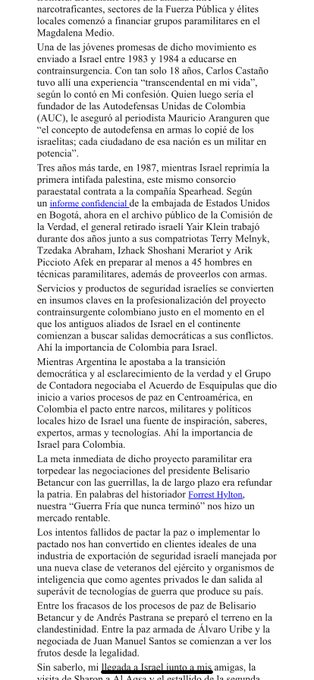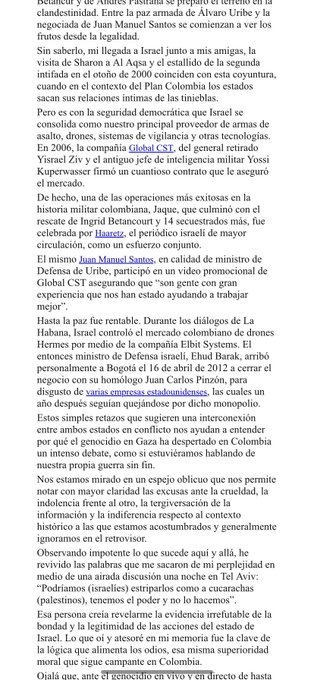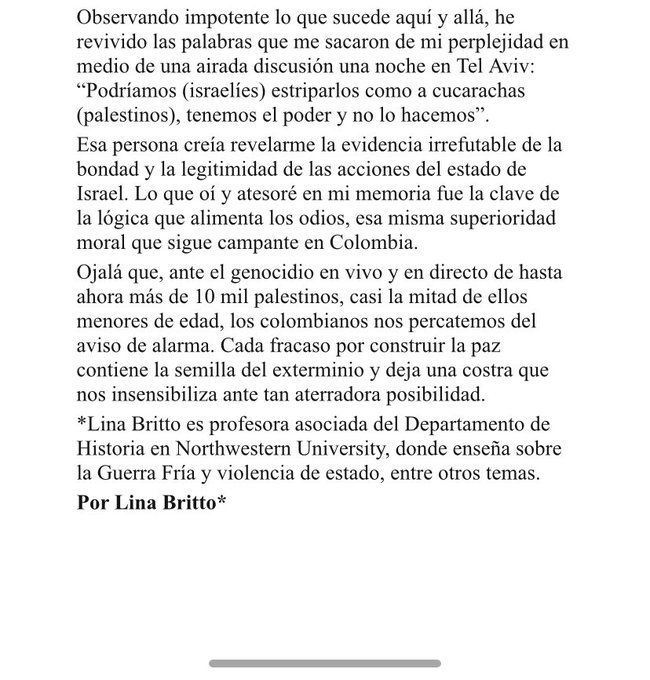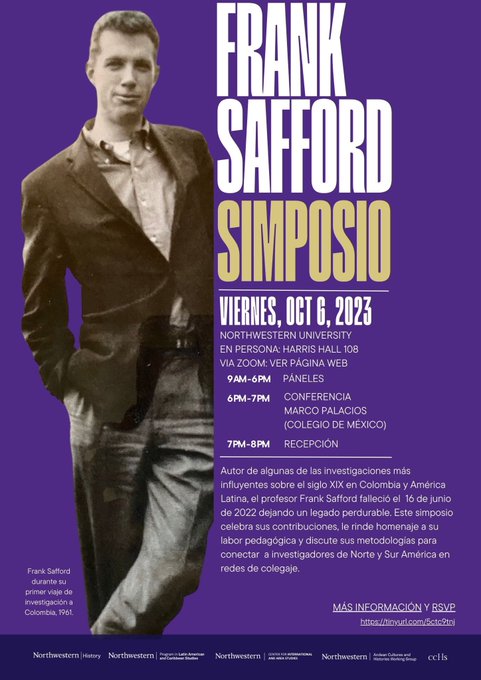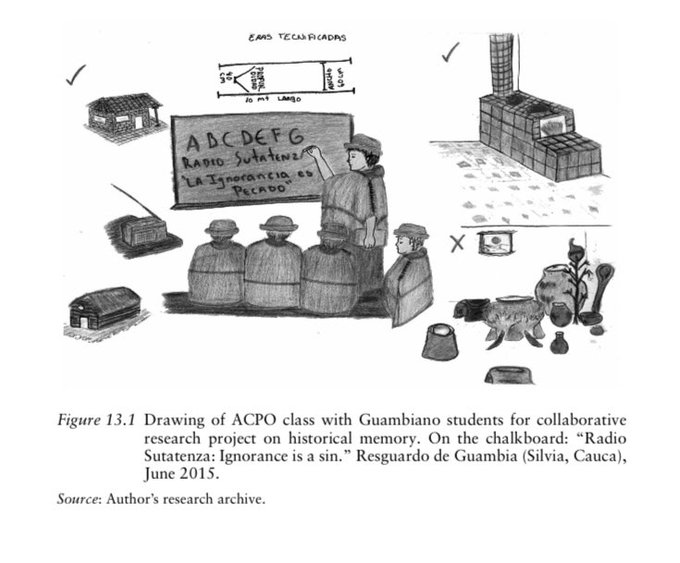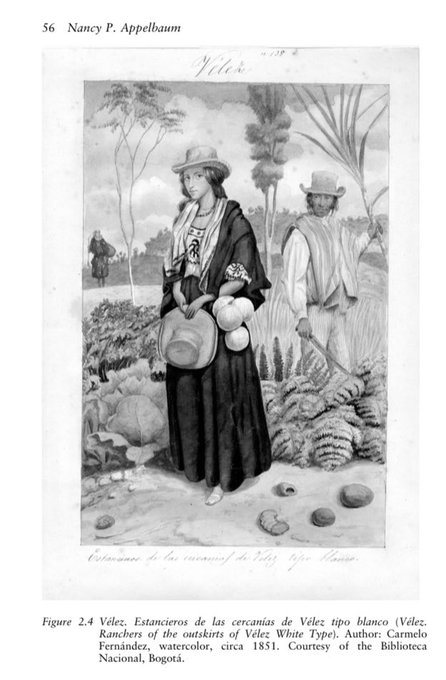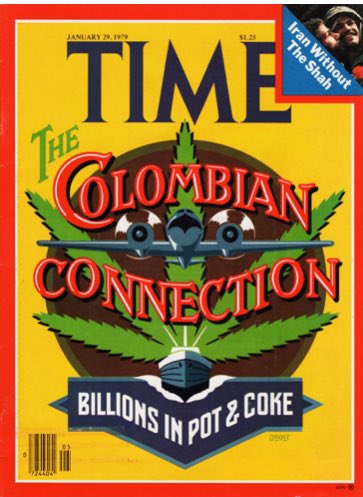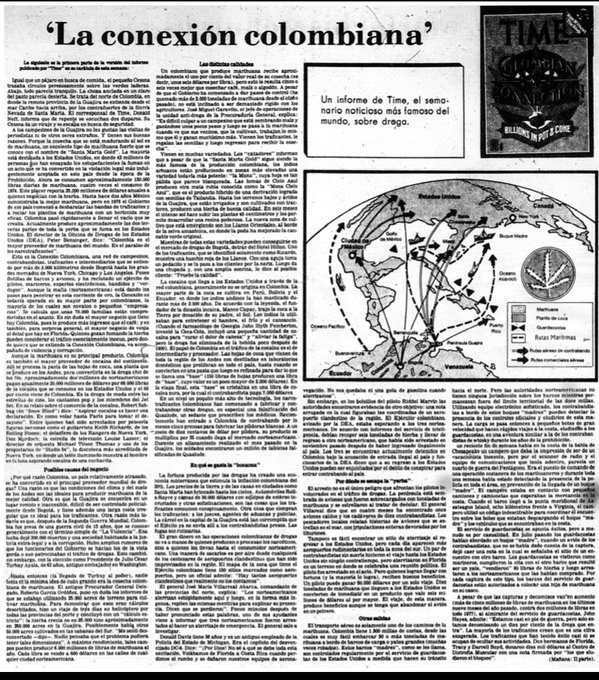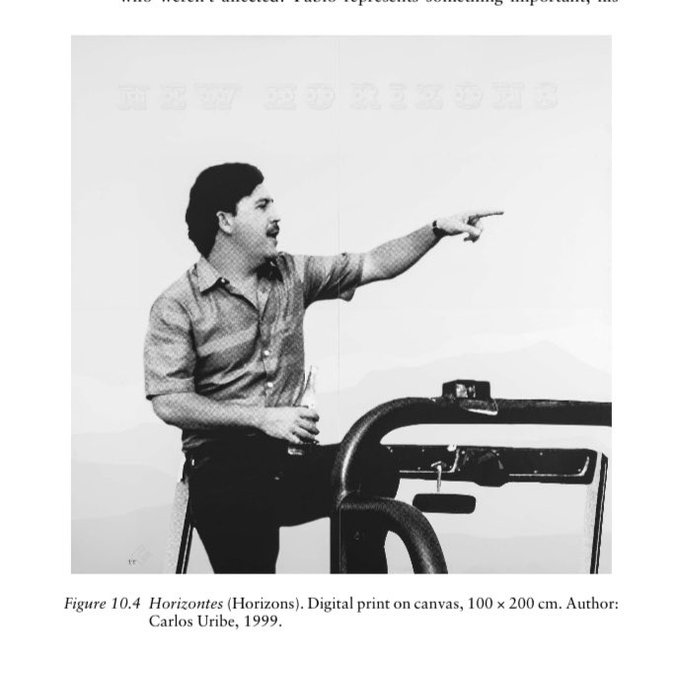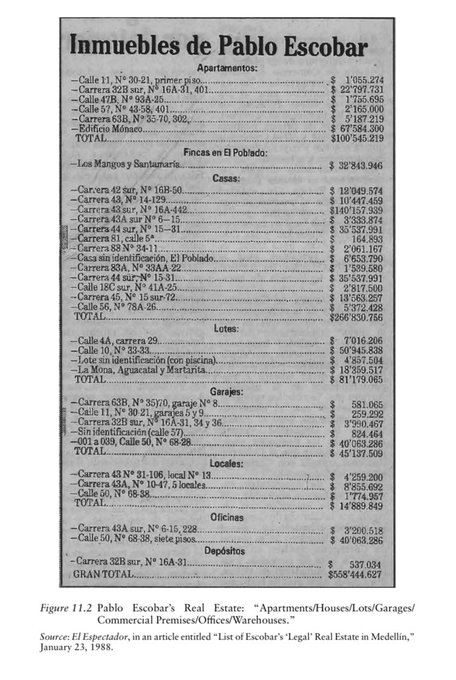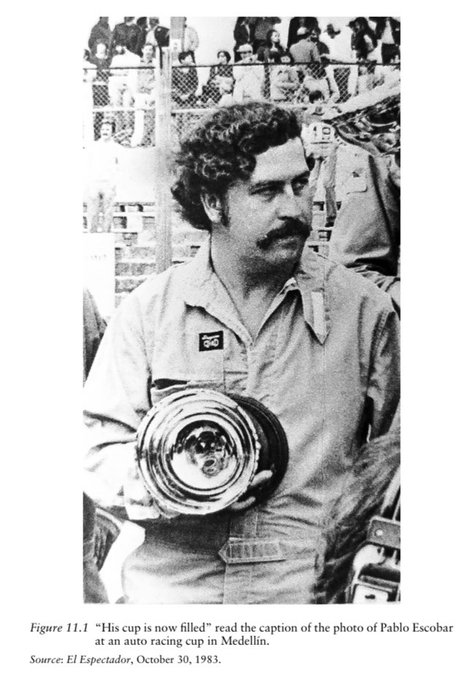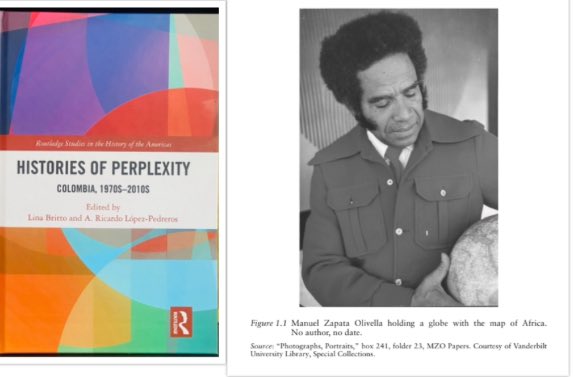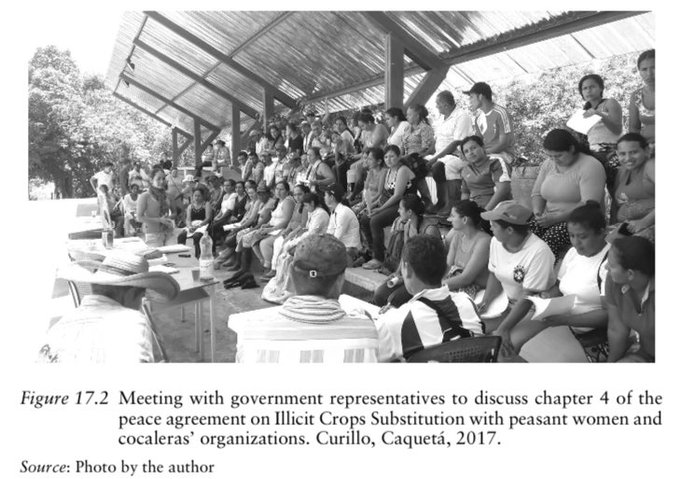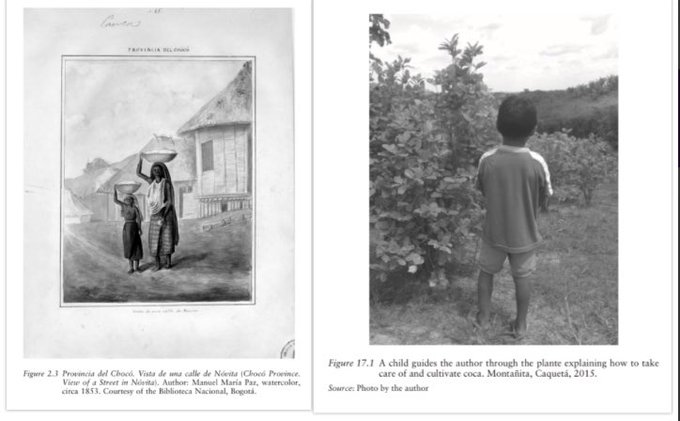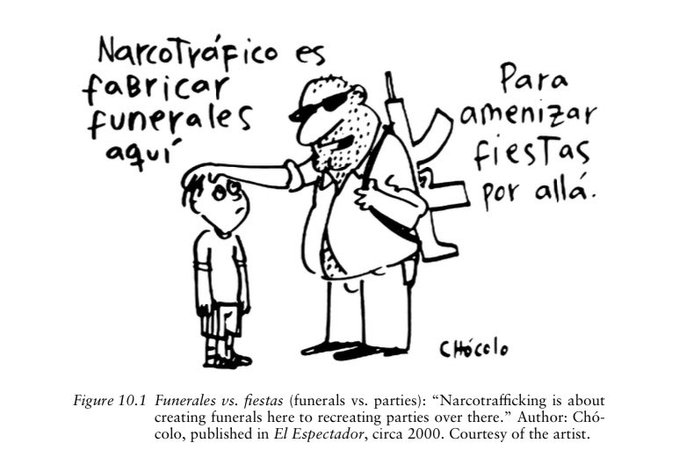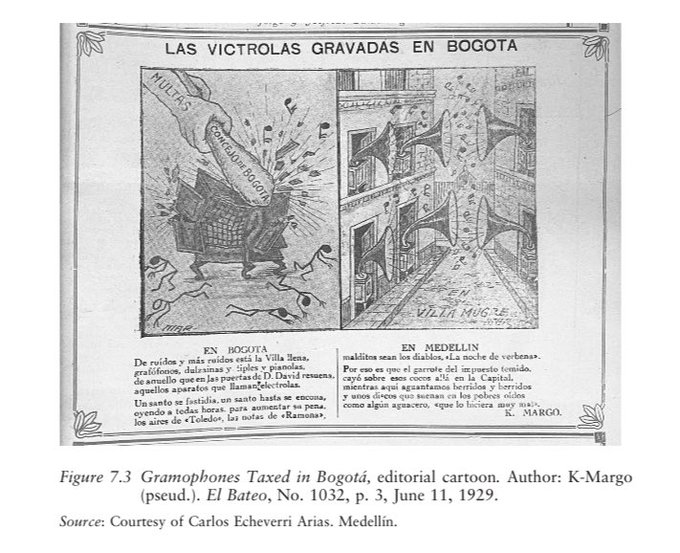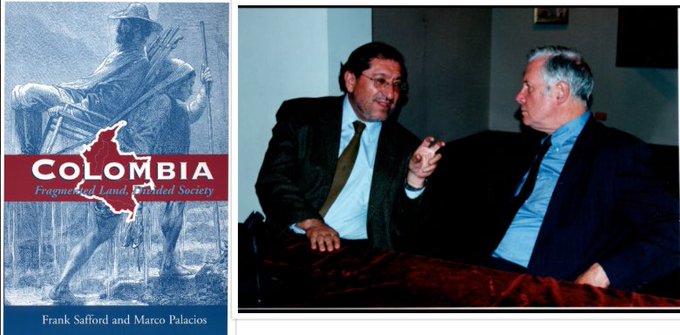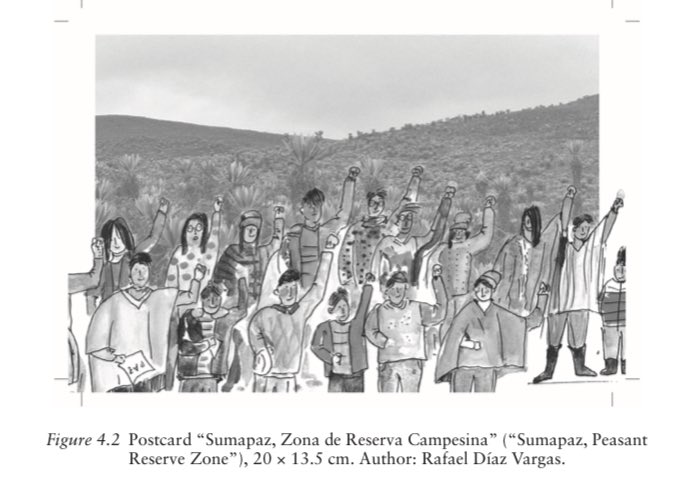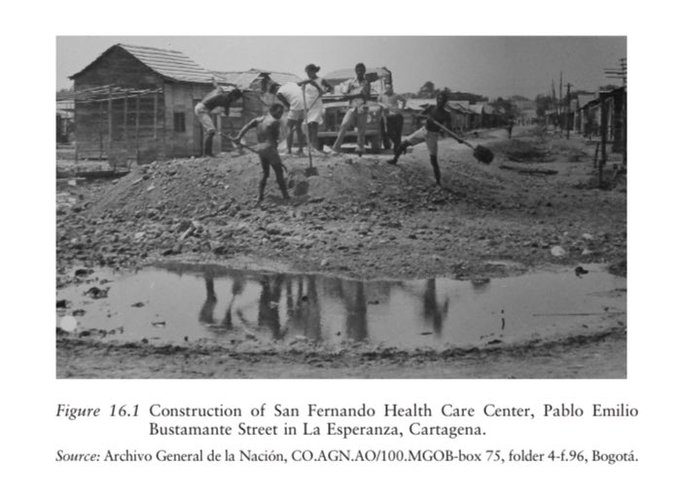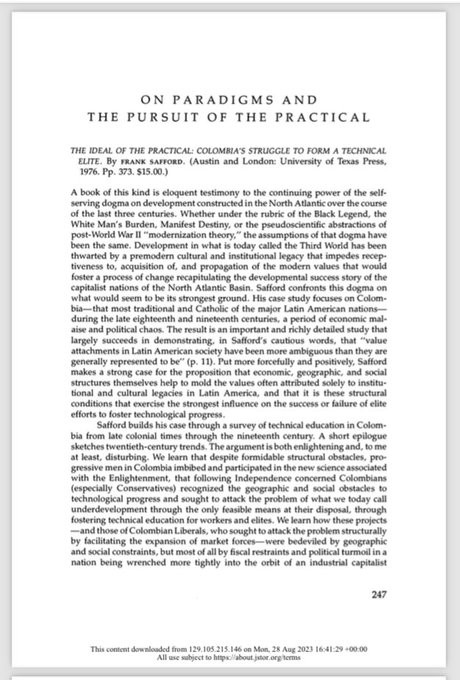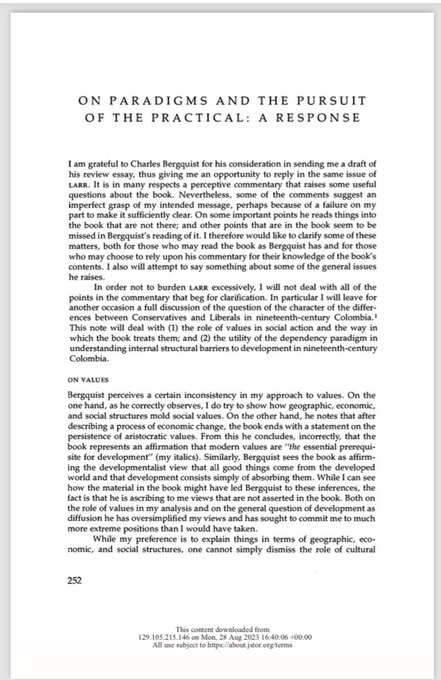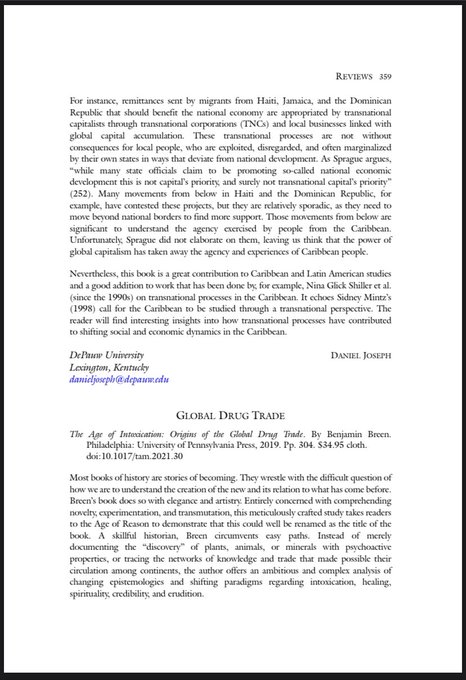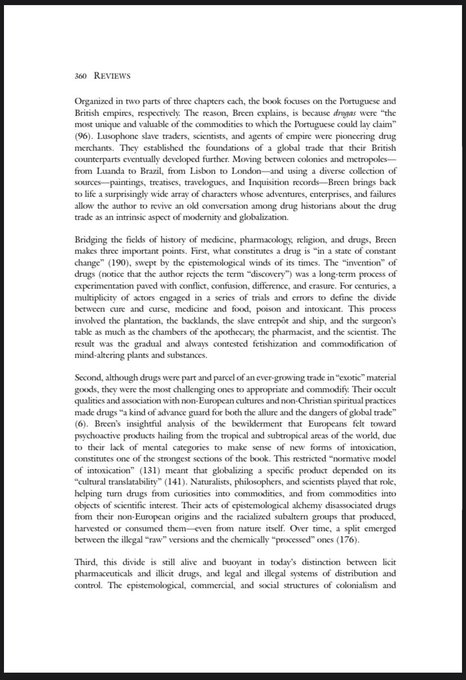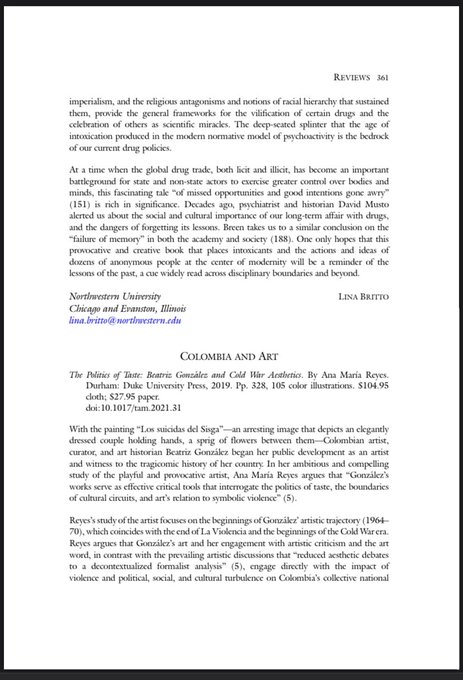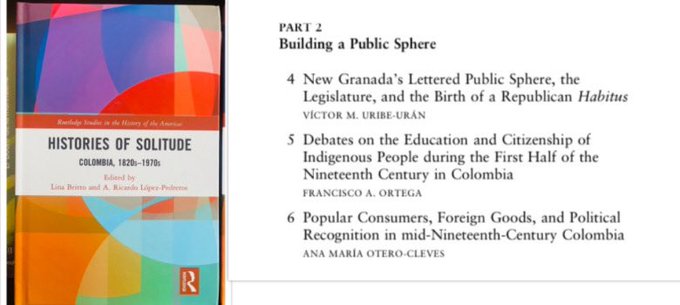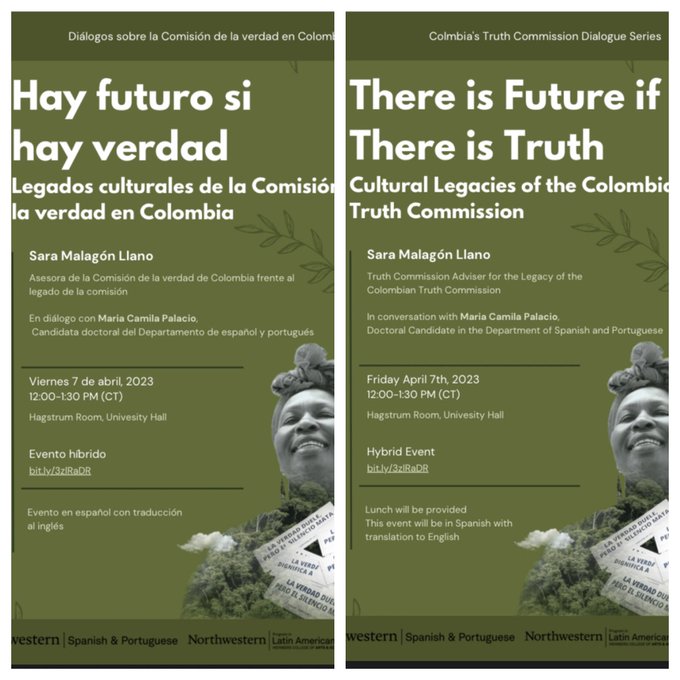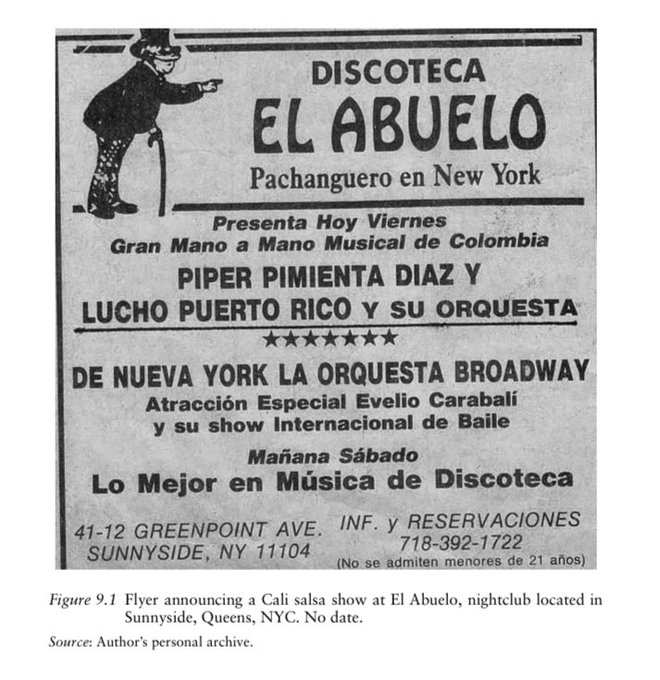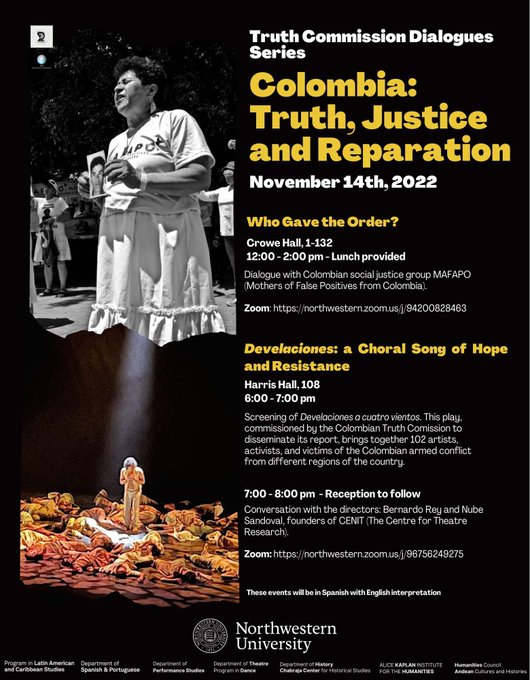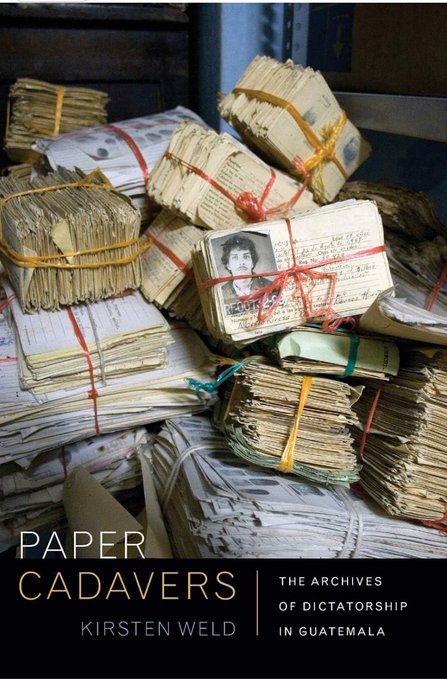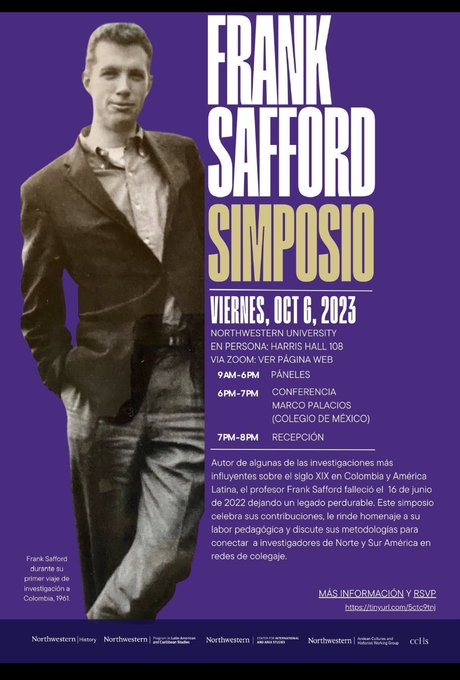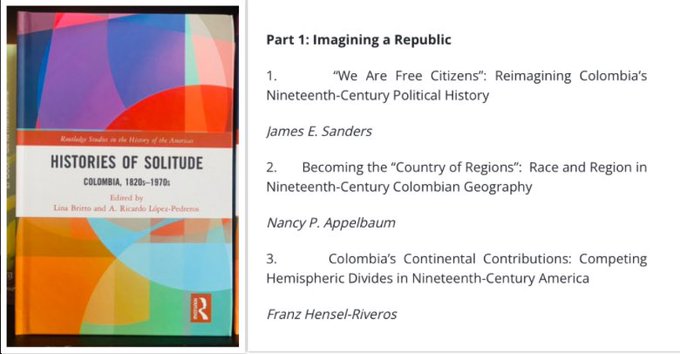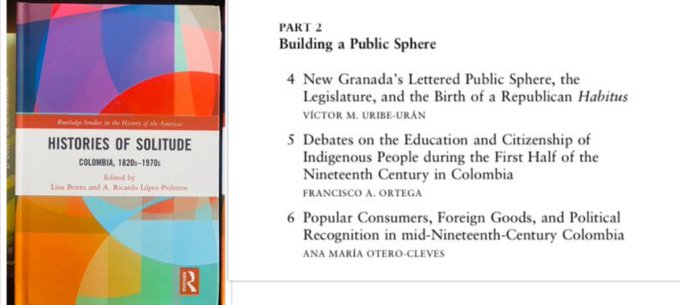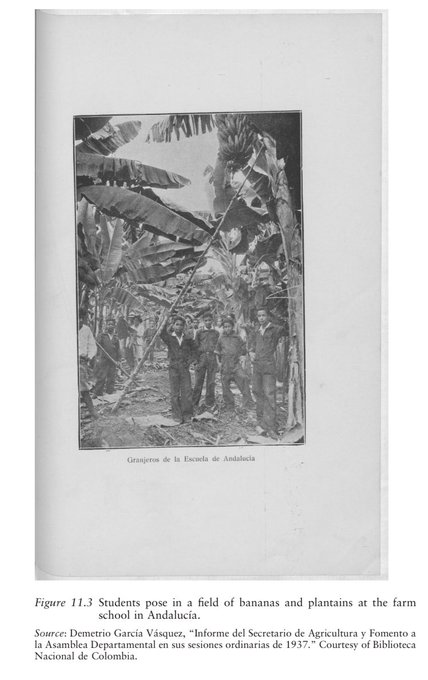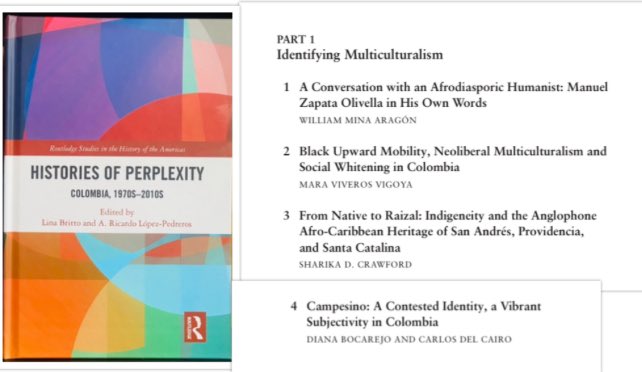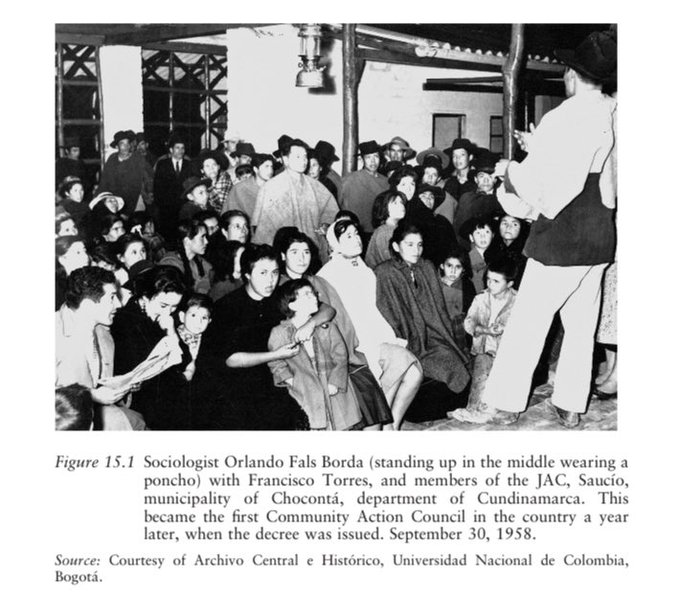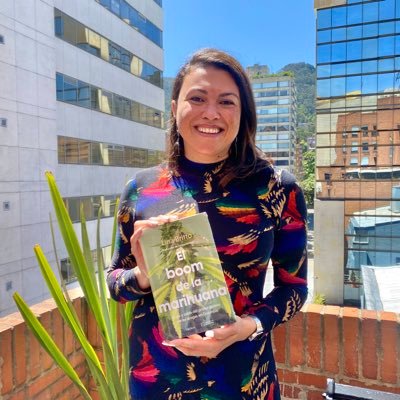
Lina Britto
@BrittoHistory
Followers
744
Following
463
Media
57
Statuses
160
Periodista 🌿 historiadora 🌿 profesora 🌿 marihuanóloga 🌿 journalist 🌿 historian 🌿 professor 🌿 marijuanologist 🌿
Chicago, IL
Joined September 2022
Don't wanna be here?
Send us removal request.
Explore trending content on Musk Viewer
Last Seen Profiles
Pinned Tweet
Hace una década, con
@arlopezpedreros
se nos ocurrió poner a circular nuevas historias de Colombia en inglés. Estábamos hartos de la invisibilidad del país en los EEUU, donde se cocinan muchas de las políticas q nos han hecho uno de los laboratorios del imperio en el mundo 🧶
4
38
119
@RoutledgeHist
Hoy, junto a
@franzhensel
@catmuno
@amoterocleves
@FJFlorezBolivar
@OrlandoDeavilaP
@oxcalvo
@lucho_van
y más, declaramos misión cumplida. Volumen 1, Histories of Solitude: Colombia 1820s-1970s, ya tiene su adelanto online
Y en marzo en edición impresa 🧶
5
26
95
@MJDuzan
@estoescambio
“En abril de 1978, cuando el programa 60 minutos, de la CBS, filtró el informe que Peter Bourne le escribió a Carter al
término de su visita a Bogotá y en el que comprometía a Turbay y a otros políticos con el tráfico de drogas […] 🧵 (1 de 3) …
4
29
64
@MJDuzan
@estoescambio
“ … y acusaron a Bourne y a la prensa internacional de tratar de manchar la imagen de Colombia en el mundo.”
… y 46 años después seguimos en las mismas
@MJDuzan
.
El capítulo 5 da muchas luces para entender el contexto amplio, más allá del escándalo y las “revelaciones”.
1
24
59
@RamiroBejaranoG
@RamiroBejaranoG
nadie ha hecho más trabajo de archivo en Colombia y en EEUU en el tema del narcotráfico q
@EduardoSaenzRov
. La biblioteca de Jimmy Carter la conoce al dedillo y en persona 🧵 (1 de 2) …
2
5
50
@RoutledgeHist
@franzhensel
@catmuno
@amoterocleves
@FJFlorezBolivar
@OrlandoDeavilaP
@oxcalvo
@lucho_van
Y junto a
@SharikaCrawfo17
@EduardoSaenzRov
@CantoRodado
@FattAlx
y muchos más, anunciamos Volumen 2, Histories of Perplexity: Colombia, 1970s-2010s. También con adelanto disponible online:
Y edición impresa en marzo.
0
12
44
@RamiroBejaranoG
@EduardoSaenzRov
@estoescambio
¿Alguna vez se ha encerrado semanas en un archivo presidencial a buscar como hormiga migajas de información y armar el rompecabezas? El desprecio por el trabajo académico del q los periodistas se benefician solo habla de la superficialidad de su análisis.
1
4
41
@MJDuzan
@estoescambio
“López Michelsen y el establecimiento liberal cerraron filas para protegerlo, desacreditaron la noticia con el argumento de que era una «campaña infame» que buscaba socavar los esfuerzos de Colombia para detener un problema que tenía sus raíces en los Estados Unidos … (2 de 3)”
1
23
38
@RamiroBejaranoG
@EduardoSaenzRov
Muchos de los documentos desclasificados q
@estoescambio
y sus periodistas de escritorio se ufanan de haber analizado están desclasificados porque él lleva décadas diligenciando FOIAs. Por cierto, ¿sabe lo q es un FOIA?
1
4
24
… and here comes part 4 of volume 2 in this series on Histories of Colombia (9 of 11) 🧵:
Titled Watching the Media, this section analyzes the competing roles of cultural and media production in shaping a neoliberal public sphere.
@arlopezpedreros
@FattAlx
@catalina_uribe
1
5
21
@CantoRodado
💯 Y todos descubriendo el fuego con los documentos de los gringos cuando muchos colombianos ya habíamos atado cabos, analizado y publicado al respecto usando el acervo documental q existe, q va más allá de cualquier documento gringo. Pero la gracia es el escándalo.
0
4
18
A comienzos de 2020, justo antes de la pandemia y el encierro, firmamos contrato con
@RoutledgeHist
y nos embarcamos en la quijotada de publicar dos volúmenes q reunieran algunos de los trabajos más recientes sobre nuestro pasado y presente 🧶
1
4
14
@MajaVelez
@Ed_Uniandes
@CesedUniandes
Por eso (y otros motivos) el argumento q EEUU nos impuso la guerra contra las drogas nunca me ha convencido.
2
0
11
@CantoRodado
Exacto, ambos exploramos con lupa la Biblioteca Presidencial Jimmy Carter en Atlanta y otros archivos en EEUU y Colombia, incluida prensa. Casi nada fue secreto. Al contrario, fue un gran escándalo q casi le cuesta la presidencia a López Michelsen. Nos negamos a tener memoria:
1
5
9
@TimothyLorek
@aalvarezgallo
,
@mmfajardoh
, and
@JimenaHurtado
examine why Colombia did not follow the recipe of the CEPAL, and found answers in president Carlos Lleras Restrepo (1966–1970) and the “fragile and volatile political and social environment in the aftermath of la Violencia.”
1
2
10
@mapalarozo
Solitude, as Fanon conceptualized it and García Márquez popularized it, is the emotional legacy of colonialism, of the invisibility of subaltern lives in the victorious narrative, a perceived state of isolation due to “a lack of conventional means to render our lives believable.”
1
3
10
@arlopezpedreros
@franzhensel
(4/4) Franz Hensel-Riveros challenges the consensus that Gran Colombia’s officers and legislators were mere “Europeanizers.” They worked to construct “a colossal republic,” a continental America, with their postcolonial debates about universal emancipation.
0
1
9
@arlopezpedreros
Historian
@SharikaCrawfo17
takes us to the San Andrés archipelago to examine how islanders use the term Raizal to resist “Colombianization,” legitimize demands for ethnic rights and political self-determination, and defend their Creole language and other cultural practices.
1
2
8
Viernes 6 de octubre por zoom y en persona con
@mapalarozo
@amoterocleves
@marcelo_bucheli
y más. Regístrate aquí:
0
2
7
@arlopezpedreros
@franzhensel
The opening chapter by James E. Sanders demonstrates that indigenous peasants, ex-slave tenant farmers, and urban artisans quickly understood that the colonial, monarchical, and feudal world they had inhabited had died, and rapidly became fluent in the language of republicanism.
1
1
7
@arlopezpedreros
@franzhensel
(3/4) In contrast, Nancy Appelbaum examines urban elites to inquire about the origins of the pervasive trope of país de regiones (country of regions) and the tools of “geographic imagining,” nineteenth-century intellectuals used to create regions out of racialized stereotypes.
1
1
7
@CantoRodado
La revista más influyente de EEUU, Time, le dio portada a Colombia a raíz de esta serie de escándalos, aunque no profundizó en los vínculos entre narcos y políticos. Meses antes el periódico francés, Le Monde Diplomatique, hecho la denuncia. Hasta El Tiempo tradujo lo publicado:
1
3
7
@EduardoSaenzR
@arlopezpedreros
Curators Santiago Rueda and Harold Ortiz explore “narco phenomena” in art, architecture, fashion, music, and culture in a collective exercise of memory that situates indigenous peoples, underground urban cultures, and counterhegemonic artistic circles at center stage.
0
1
6
@arlopezpedreros
Anthropologist Mara Viveros scrutinizes neoliberal multiculturalism through biographical accounts of Afro-Colombian men and women. She argues that by making upward mobility possible for some, multiculturalism has attained a degree of consent, while reinforcing structural racism.
1
2
6
@AparicioCuervo
@aalvarezgallo
@TimothyLorek
@mmfajardoh
@JimenaHurtado
Exactamente sobre eso es el ensayo: por qué se toma el camino de la tecnocracia y no el de la CEPAL. Aquí se compra ebook:
2
0
6
@mapalarozo
Perplexity is a state of puzzlement and alienation that surfaces when one is confronted with deep changes or at an impasse, an “epistemic emotion” that can be either paralyzing or a catalyst for transformation.
See Helen De Cruz’s essay, Midwest Studies in Philosophy 45 (2021).
1
1
7
Last, Estefanía Ciro
@CantoRodado
offers a detailed ethnographic work that centers the analysis of the armed conflict on the War on Drugs by “listening to the lives of cocaleras” of the Caquetá region on the “triad” of oppression they endured.
1
2
7
@mapalarozo
They also condense the spirit of our invitation to revisit major narratives, that is, the “solitude” of nation-state formation that we examine in Volume 1, and the “perplexity” of the neoliberal turn that we study in Volume 2.
@CantoRodado
0
2
5
@CantoRodado
Together, the chapters analyze the internal conflict beyond armed confrontations, to examine the nuts and bolts of everyday life in war zones.
0
0
5
@platom___
@Ariasvilla
No es simple afinidad, es intimidad en el negocio de la guerra:
0
0
5
Historian
@EduardoSaenzR
revisits Colombian and U.S. declassified documents on president César Gaviria’s (1990–1994) neoliberal agenda and the U.S.-financed hunt for Pablo Escobar, revealing how crucial anti-narcotic policies were in the consolidation of neoliberalism in Colombia
1
0
5
@EduardoSaenzR
@arlopezpedreros
The shared ethics and aesthetics of narcotrafficking and neoliberalism are the central themes of a series of conversations in this section’s final chapter.
1
0
5
@arlopezpedreros
In conversation with Mina, Zapata Olivella models how to embrace an abigarrada—motley—reality, imagines a different humanity, and materializes an alternative conception of freedom other than the individualistic version of the dominant Western epistemology.
1
1
5
@irmalon
@MJDuzan
@estoescambio
@CIA
Con “seguimos en las mismas” me refería a q el establecimiento sigue cerrando filas para proteger a los suyos y negando q el agua moja.
Por otro lado, q no se nos olvide q mientras la DEA perseguía a los narcos en Colombia, la CIA traficaba con ellos en Centro América.
0
1
5
The titles evoke a conversation that Marco Palacios and Frank Safford had when they were crafting their book in the late 1990s. An anecdote between two seasoned historians inspired us to unpack the canons through which Colombia has been read and interpreted.
@mapalarozo
1
0
4
@arlopezpedreros
@SharikaCrawfo17
Last, anthropologists Diana Bocarejo and Carlos del Cairo analyze how multiculturalism has reshaped class-based identities as well. They focus on Zonas de Reserva Campesina (Peasant Reserve Zones) to illustrate the political disputes between campesino movements and the state.
1
1
4
@oxcalvo
@OrlandoDeavilaP
shows how community development did not solely masqueraded U.S. hard power or the National Front’s oligarchic rule. Looking at Cartagena, he analyzes how neighbors created a vision of democracy as protest, public assembly, direct-action, and social justice.
1
0
4
@MajaVelez
@Ed_Uniandes
@CesedUniandes
Asi es querida
@MajaVelez
, casi todas esas leyes respondían a obligaciones internacionales q adquiría Colombia al ratificar legislaciones internacionales prohibicionistas. Pero también había mucho de moralismo católico propio.
0
1
4
@murieljimenez
Y Bergquist vs Safford … de acuerdo contigo
@murieljimenez
, eran una generación de pugilistas… no aprendimos nada 😂
1
0
4
@amoterocleves
Te lo acabo de mandar por WhatsApp. Por aquí no se pueden enviar PDFs?
Y para quien sea q le interese, aquí pantallazo (es solo 3 páginas):
0
0
4
@mapalarozo
Both terms encapsulate the sensibilities that historians and social scientists have to work through when looking for categories to decipher the realities of the postcolonial societies we seek to understand.
1
1
4
@profe_gonzalo
@AparicioCuervo
@aalvarezgallo
@TimothyLorek
@mmfajardoh
@JimenaHurtado
El ensayo más bien sugiere cómo en el caso de Lleras Restrepo tecnocracia y CEPAL no era antónimos y más bien revela cómo se conjugaban tanto en lo estatal como en lo personal (la amistad del presidente con Raúl Prebisc, por ejemplo).
1
0
3
@arlopezpedreros
The next two chapters continue exploring how multiculturalism is not merely an act of camouflage to disguise the realities of neoliberalization but a common “language of contention” used by various actors when engaging with the state.
1
0
3
@IdcaranCo
@arlopezpedreros
Gracias, querida Claudia! Ahora lo importante es q circule y se lea ampliamente 📚📚📚
0
1
3
@EduardoSaenzR
Anthropologist Alejandro Ulloa Sanmiguel illuminates the connection Cali-New York through the salsa music industry, the cocaine export business, and the dynamics of migration, and the new notions of entrepreneurial individualism that granted legitimacy to this economic activity.
1
0
3
@lucho_van
I love to pair
@kirstenweld
book with the documentary La Isla: Archives of a Tragedy by Uli Stelzner (2009)
1
0
3
@arlopezpedreros
@catmuno
Francisco Flórez, George Palacios, and Ana Milena Rhenals analyze how and why black intellectuals read Vasconcelos’ Cosmic Race (1925) through a “blackening filter,” understanding mestizaje not as a strategy of whitening and assimilation but as a device for political mobilization
1
1
2
@RogueChieftan
🤔 I don’t think is so simple. For a great discussion about it in the case of the Caribbean: Melanie J. Newton, “Returns to a Native Land: Indigeneity and Decolonization in the Anglophone Caribbean,” Small Axe 17:2 (July 2013): 108-122.
1
0
3
@BigBigBLessing
@UChicagoCLAS
@CesedUniandes
@DSDProgram
@Ed_Uniandes
☺️ We inaugurated the Colombia Global collection. I’m in such a good company!
0
0
2
The ideal of the small farmer, and his role in a modern economy is the topic of the next chapter by
@TimothyLorek
. His work explores the history of the Liberal Republic’s farm schools in Valle del Cauca seeking a “robust, diversified, and self-sufficient agricultural sector.”
1
0
2
@oxcalvo
@OrlandoDeavilaP
Last,
@lucho_van
analyzes generations of activists and intellectuals who articulated “diverse, heterodox, sometimes radical, ideas about social and political change” and human rights questioning the notion of state violence as a precondition for development and democracy.
0
0
2
@VickyDavilaH
Difícil saber si esta lista de imprecisiones y falacias es adrede o simple y pura ignorancia. Leer este trino es como retroceder un siglo, cuando comenzó de manera sistemática la satanización mediática de la yerba.
0
2
2
@MajaVelez
@ProfRickLines
Excelente! Hacía mucha falta algo así en el salón de clases. Gracias!
0
0
2
@CantoRodado
@lucas_marinll
@MajaVelez
Gracias
@lucas_marinll
Siempre he pensado q nuestros libros van de la mano, querida Estefanía
@CantoRodado
1
0
2
@ursus_on_bike
Ese es precisamente el objetivo: q las historias de Colombia en inglés se actualicen y estén a la par con la originalidad, la creatividad y la diversidad de perspectivas de lo q publicamos dentro de Colombia en castellano. A ver si dejamos de estar tan solos y tan perplejos!
0
0
1
@oxcalvo
examines the social technologies that the state put in place to adapt the civil and military cooperation schemes of U.S. aid programs as instruments of governance. He demonstrates that the country was a laboratory for “a tamed revolution.”
2
1
2
@GustavoBolivar
@petrogustavo
En serio
@GustavoBolivar
? Inadmisible! Nada aquí es revelación. Todo se sabía hace rato. Es obligación de un político de su nivel educarse sobre nuestra historia reciente. Es mucho lo q hay escrito sobre el tema. Vergonzoso este trino!
0
0
2
@arlopezpedreros
Catalina Muñoz examines how popular demands for “access to culture as a right” challenged the Liberal Republic (1930–46) to break with paternalistic conceptions of popular culture, and prompted the creation of an unprecedented state apparatus for cultural management.
1
1
2




















